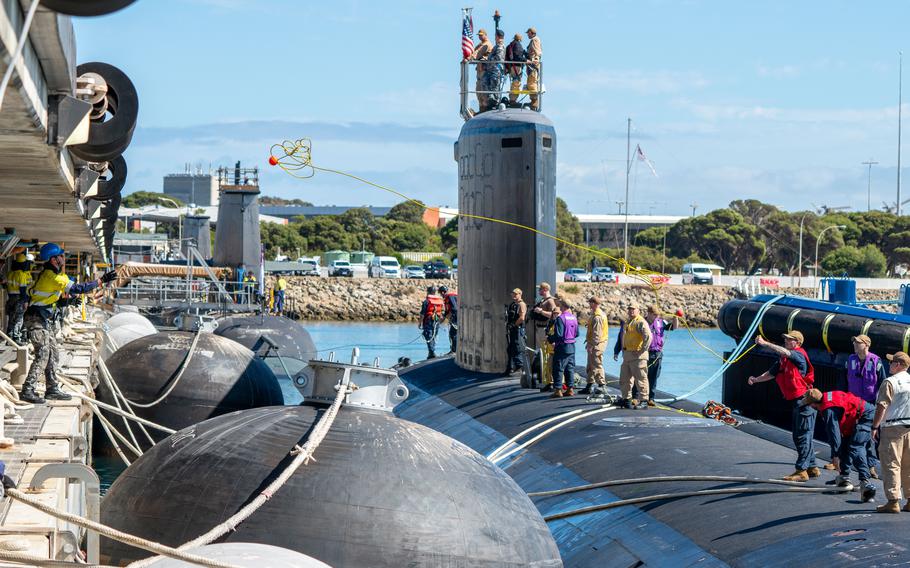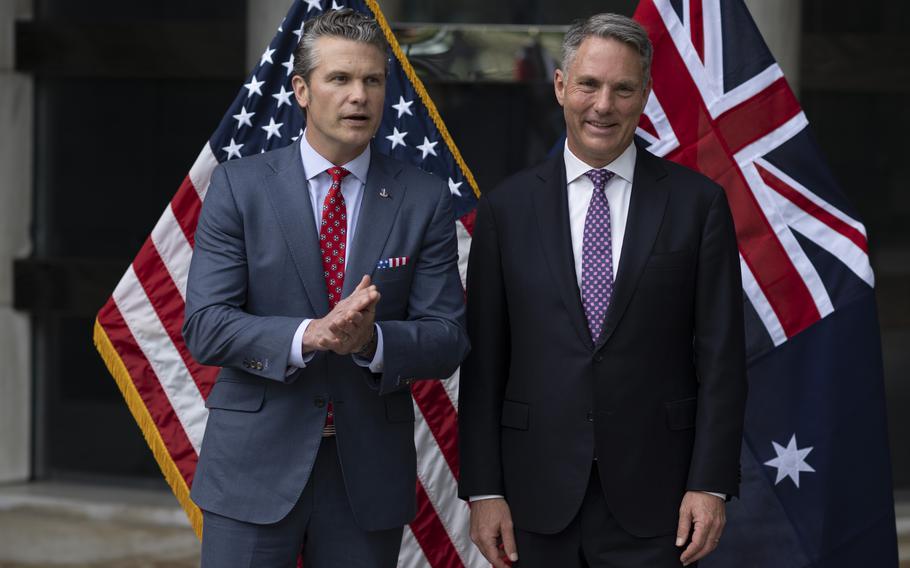
Sailors assigned to the Virginia-class submarine USS Minnesota conduct mooring operations at HMAS Stirling, Western Australia, Australia, on Feb. 25, 2025. (U.S. Navy photo)
WASHINGTON — The Pentagon is reviewing a Biden-era deal to share nuclear-powered submarine technology with Australia and the United Kingdom and could scrap the deal if it doesn’t align with President Donald Trump’s agenda.
A 2021 pact by Australia, the United Kingdom and the United States — known as AUKUS — was formed to build up Australia’s maritime capabilities in the Indo-Pacific region to counter China. The agreement outlines the U.S. selling at least two Virginia-class submarines to Australia in the 2030s, with other submarines jointly built. The U.S. and Britain are also training Australian navy personnel, which began in 2023 as part of the agreement.
The review is being conducted to verify the pact meets Trump’s “common sense, America first criteria,” according to a defense official who spoke Thursday on the condition of anonymity.
“As [Defense Secretary Pete Hegseth] has made clear, this means ensuring the highest readiness of our service members, that allies step up fully to do their part for collective defense, and that the defense industrial base is meeting our needs,” the official said.
The review drew backlash from some lawmakers who have been staunch advocates of the trilateral agreement, including Sen. Tim Kaine of Virginia, a member of the Senate Armed Services Committee and the top Democrat of the subcommittee on seapower.
“If this administration is serious about countering the threat from China — like it has said as recently as this morning — then it will work expeditiously with our partners in Australia and the U.K. to strengthen this agreement and ensure we are taking steps to further boost our submarine industrial base. Anything less would play directly into China’s hand,” Kaine said in a statement Wednesday.
Rep. Joe Courtney of Connecticut, the top Democrat on the House Armed Services Committee’s seapower subpanel, pointed out the United Kingdom conducted their own review of AUKUS. He said the U.S. will likely reach the same conclusion as the U.K: “AUKUS is overwhelmingly in the interest of all three nations and the entire Indo-Pacific.”
“Abandoning AUKUS would cause lasting harm to our standing with close allies and rejoice in Beijing,” Courtney said.
Australia’s defense minister dismissed concerns Thursday that the deal was under review, The Associated Press reported. Australian Defense Minister Richard Marles told local reporters that he had known about the review of the deal “for some time,” saying it was a “very natural step for the incoming administration to take.” He noted the UK’s government also reviewed AUKUS after it was elected, and his own government had looked at it as part of its own review of Australia’s entire defense posture.
“I think an incoming government having a look at this is something that they have a perfect right to do, and we welcome it and we’ll work with it,” he said.

Defense Secretary Pete Hegseth and Australian Defense Minister Richard Marles deliver remarks prior to a bilateral exchange at the U.S. Embassy in Singapore on May 30, 2025. (Defense Department)
Hegseth and Marles met on the sidelines of a defense conference in Singapore less than two weeks ago. Afterward, Marles told reporters that he was optimistic and had come away with “a sense of confidence about the way in which AUKUS is proceeding,” the AP reported.
Hegseth’s address to the defense forum made multiple mentions of cooperation with Australia but no reference to AUKUS. Hegseth later mentioned the deal when he was taking questions, urging allies in the Indo-Pacific to increase their defense spending and underscored the need for a “strong, resolute and capable network of allies and partners” as the U.S. seeks to counter China.
In January, Australia made the first of six $500 million payments to the U.S. under the AUKUS deal. And in February, the Virginia-class USS Minnesota arrived in Western Australia, marking the first of several planned visits by U.S. submarines this year.
For years, the U.S. Navy has struggled to keep the construction of its Virginia-class submarines on track. A shipbuilding review last year found the submarines were 24-36 months behind schedule.
Michael Sharpe, the chief executive officer of the AUKUS forum, lauded the review as an assessment that has the potential to strengthen the allied program for the long term. The review, he said, presents Australia with the opportunity to take on more of the industrial burden felt by the U.S. The forum is a member-led organization connecting industry, academia, research, government, and defense across the three partner countries.
“The reality is well known: the United States submarine industrial base is stretched. The challenge of building two Virginia-class submarines per year, while simultaneously ramping up Columbia-class production, places enormous demand on the U.S. workforce and supply chain. The AUKUS agreement was never about adding to that burden — it was about designing a solution,” Sharpe said.
He suggested Australia help produce heavy forgings, submarine-grade steels, precision components and specialized parts that align with Virginia-class requirements. Sharpe witnessed the skills, he said, at the forum’s first AUKUS Steel and Forging Summit earlier this year.
“AUKUS was never meant to be a one-way transaction. It is designed to integrate our nations — industrially, technologically, militarily — to meet shared threats and seize shared opportunities,” Sharpe said. “The submarine program is not simply an acquisition — it is the launch pad for a new era of joint industrial capability.”
The Associated Press contributed to this report.